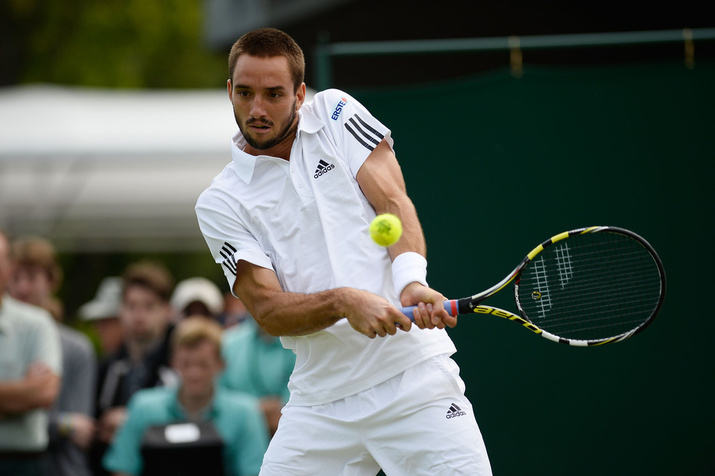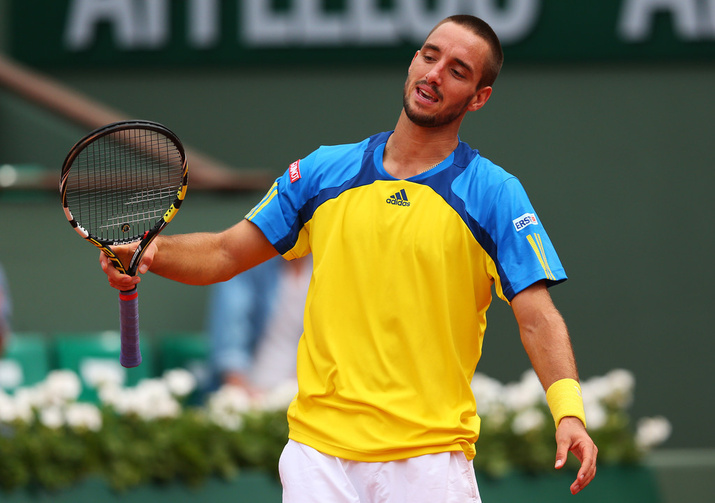Don't miss any stories → Follow Tennis View
FollowViktor Troicki Returns from Suspension
After a one-year doping ban, Viktor Troicki returned to action on Monday after accepting a wild card into Gstaad. He quickly returned to the win column with a straight-sets victory over eighth seed Dominic Thiem, an upstart who saw a rapid rise during the Serb's absence. Troicki will advance to face Andrey Golubev in the round of 16 at the Swiss Open.

The Serb was suspended after refusing to take a blood test at the Monte Carlo event in April 2013. Among other statements, he claimed that he was under the weather at the time, but he did give a urine sample. The chain of events that followed varies depending on the source. Nonetheless, despite efforts from his countryman Novak Djokovic and others, Troicki was given an 18-month ban by the International Tennis Federation that was ultimately reduced to a year.
Regardless of opinions by some players that the current doping policy is flawed, a stiff punishment was handed down to Troicki. In comparison to sports such as baseball that have seen major scandal, where arguments of consistency and severity of punishment have been debated for well over a decade, the ITF appeared to be sending a strong message by acting swiftly in response to this situation.
However, how severe was Troicki's punishment? His ability to return to an ATP 250 tournament via a wild card has spurred debate. In April 2013, the former top-20 competitor was world No. 44. Not having played a match since July 2013, Troicki has seen his ranking fall to No. 847. Thus, a debate has ensued on his allowance into an ATP tournament over other players possibly more deserving of a wild card. Regardless, where does the 28-year-old go from here? With his current position, initially finding ways into Challenger events appears to be a difficult task. Certainly, it could be a long road back to relevance for the Belgrade native.
In the larger picture, do Djokovic and others have a point as to the fairness of tennis' anti-doping policy? Thus far, 2014 has been fairly quiet on the anti-doping front. In 2013, however, ATP player Marin Cilic and WTA doubles specialist Nuria Llagostera Vives were suspended for positive results after testing at tournaments. Cilic tested positive for the stimulant nikethamide but received only a four-month suspension after he convinced the ITF that the drug was taken through glucose tablets after they were mistakenly purchased by his mother. Meanwhile, Llagostera Vives tested positive for a methamphetamine that she could not explain and received a two-year ban. Troicki refused a blood test and claimed he misunderstood some of the testing procedures, leading to a one-year suspension. Clearly, the harshness and uniformity of the penalties are open to debate.

Meanwhile, Troicki appears to have put the past year behind him and now looks towards the future. “I felt some tightness in my game and pressure as I played this first match,” he said. “I'm very happy that I'm through and that I won. I'm hoping to get back to where I was before the suspension. It was very emotional and very strange for me. I want to thank the organizers for this wild card, which means a lot to me.”
Troicki also acknowledged the difficulties of the last 12 months. “This past year was the toughest of my life. It's very emotional to be back and see all of the guys.”
At the end of the day, the Serb is back, while the discussion on tennis' anti-doping policy and performance-enhancing drugs in the sport will continue. Thus far, tennis has escaped the sort of staggering credibility blow that has embarrassed other sports. Whether the policies in place will maintain its integrity remains to be seen. However, with the constant swirling rumors of cheating in all sports, bans such as Troicki's penalty could very well be the norm as time moves forward.










